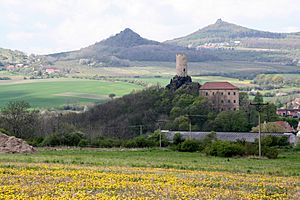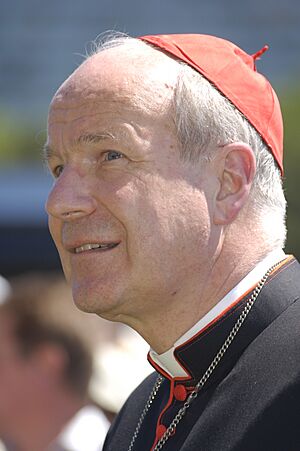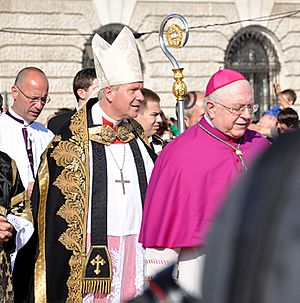Christoph Schönborn facts for kids
Quick facts for kids His Eminence Christoph Schönborn OP |
|
|---|---|
| Cardinal, Archbishop emeritus of Vienna | |
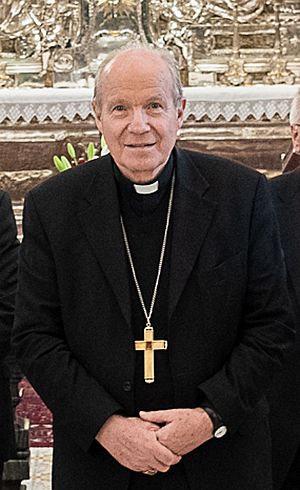
Cardinal Schönborn in 2020
|
|
| Archdiocese | Vienna |
| See | Vienna |
| Appointed | 13 April 1995 (Coadjutor) |
| Enthroned | 14 September 1995 |
| Reign ended | 22 January 2025 |
| Predecessor | Hans Hermann Groër |
| Other posts |
|
| Orders | |
| Ordination | 27 December 1970 |
| Consecration | 29 September 1991 by Hans Hermann Groër |
| Created Cardinal | 21 February 1998 |
| Rank | Cardinal Priest |
| Personal details | |
| Born | 22 January 1945 Skalka Castle, Reichsgau Sudetenland, Germany (now Czech Republic) |
| Nationality | Austrian |
| Denomination | Catholic Church |
| Parents | Hugo-Damian, Graf von Schönborn, Eleonore Schönborn |
| Previous post |
|
| Motto | Vos autem dixi amicos (I have called you friends) — John 15:15 |
| Coat of arms |  |
| Styles of Christoph Schönborn |
|
|---|---|
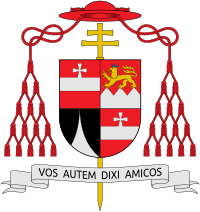 |
|
| Reference style | His Eminence |
| Spoken style | Your Eminence |
| Informal style | Cardinal |
| See | Vienna |
Christoph Schönborn (born 22 January 1945) is an Austrian Catholic leader. He was the Archbishop of Vienna from 1995 until 2025. He also led the Austrian Bishops' Conference from 1998 to 2020. In 1998, he became a Cardinal. He is a member of the Dominican Order, a religious group in the Catholic Church.
Cardinal Schönborn is also a Grand Chaplain of the Order of the Golden Fleece. This is an important group in Austria. He is part of the historic House of Schönborn family. Many people from his family held important positions in the Holy Roman Empire and the Catholic Church.
Contents
Early Life and Family History
Christoph Schönborn was born in 1945 at Skalka Castle. This castle is in a region that is now part of the Czech Republic. His parents were Count Hugo-Damian von Schönborn and Baroness Eleonore von Doblhoff. His family, the House of Schönborn, is very old and has a long history.
Many members of his family were important leaders in the Catholic Church. They also held high positions in the Holy Roman Empire. During World War II, his father was part of a group that resisted the Nazis. After the war, his family had to leave their home and moved to Austria in 1945.
His parents divorced in 1959. Christoph has two brothers and one sister. His brother Michael Schönborn is an actor. He grew up in Schruns, a town in western Austria. He speaks several languages, including German, French, Italian, and some English, Spanish, and Latin.
Becoming a Church Leader
In 1963, Christoph Schönborn finished school and joined the Dominican Order. He studied theology (the study of religious faith) in Paris. He also studied philosophy and psychology in other cities.
He became a priest on 27 December 1970 in Vienna. He continued his studies and earned a doctorate in theology. From 1975, he taught dogmatic theology at a university in Switzerland. He also helped write the Catechism of the Catholic Church. This book explains the beliefs of the Catholic Church. In 1991, he became an auxiliary bishop in Vienna.
Leading the Archdiocese of Vienna
Christoph Schönborn became the Archbishop of Vienna on 14 September 1995. He was made a Cardinal by Pope John Paul II in 1998. Cardinals are high-ranking leaders in the Catholic Church. They help the Pope and can vote for a new Pope. Cardinal Schönborn voted in the elections for Pope Benedict XVI in 2005 and Pope Francis in 2013.
He was the head of the Episcopal Conference of Austria from 1998 to 2020. This group includes all the Catholic bishops in Austria. He also served on several important committees in the Holy See, which is the government of the Catholic Church.
His special saying as a bishop is Vos autem dixi amicos. This means "I have called you friends" from the Bible (John 15:15). His coat of arms includes symbols from his family.
Cardinal Schönborn led the funeral service for Otto von Habsburg in 2011. Otto von Habsburg was a former Crown Prince of Austria-Hungary. In 2012, Pope Benedict XVI chose him to be a leader for a meeting about spreading the Christian message.
He visited Iran in 2001 and met with Ayatollah Ali Khamenei. This was an important meeting between Catholic and Iranian leaders. He is known for being good at handling difficult situations. He had a close relationship with Pope Benedict XVI.
In 2017 and 2018, he hosted special events in St. Stephen's Cathedral. These events included prayer services and a play. They helped raise money for people with HIV/AIDS.
Handling Challenges in the Church
Cardinal Schönborn has spoken about important issues facing the Church. He has said that the Church needs to be open and honest about past problems. He praised Pope Benedict XVI for pushing for investigations into difficult situations.
He also faced a group of priests in Austria called the Pfarrer Initiative. This group wanted some changes in the Church, like allowing priests to marry. Cardinal Schönborn met with them. However, he also said that priests must follow the official teachings of the Church.
His Views on Important Topics
Cardinal Schönborn is known for being open to discussion and finding common ground.
He is part of the Elijah Interfaith Institute. This group brings together leaders from different religions to talk and understand each other better. He has also supported efforts to build stronger relationships between Jewish and Christian faiths.
He has spoken about the relationship between Catholicism and Islam. He believes it is important for different religions to talk to each other. He has also said that Europe's Christian heritage is important. He believes that if this heritage is in danger, it is because Europeans have not valued it enough. He has made it clear that his comments were not against refugees.
Cardinal Schönborn has also discussed how the Church can support people in different life situations. He believes that church leaders should focus on the good in people's lives. He has said that the Church should walk alongside people, even if their lives do not perfectly match Church teachings.
In 2021, he said he would not refuse to bless same-sex couples if they asked. He also commented on a Vatican document about blessings in 2024, saying it showed "confusion on the part of the Church."
He has also spoken about different types of church services. He believes that the Lord guides the Church through changes.
Regarding evolution, he wrote an article in 2005. He said that evolution might be true. However, he also said that the idea of evolution happening completely by chance, without any plan, does not fit with Catholic teaching. He believes there is evidence of design in nature.
In 2012, a young gay man was elected to a church council in Vienna. The local priest initially did not allow him to serve. After meeting with the couple, Cardinal Schönborn supported the young man's role. He advised priests to be understanding when guiding people.
In 2019, he said he was open to the idea of married men becoming priests. This is already allowed in some parts of the Catholic Church. However, he still believes that priests generally should not marry.
Health and Retirement
In March 2019, Cardinal Schönborn shared that he had prostate cancer. He had surgery in May 2019, which was successful.
He turned 75 in January 2020. At that age, bishops usually offer their resignation to the Pope. Pope Francis accepted his resignation as Archbishop of Vienna on 22 January 2025, his 80th birthday. He had already stepped down as president of the Austrian Bishops Conference in 2020.
See also
 In Spanish: Christoph Schönborn para niños
In Spanish: Christoph Schönborn para niños
 | Bessie Coleman |
 | Spann Watson |
 | Jill E. Brown |
 | Sherman W. White |


